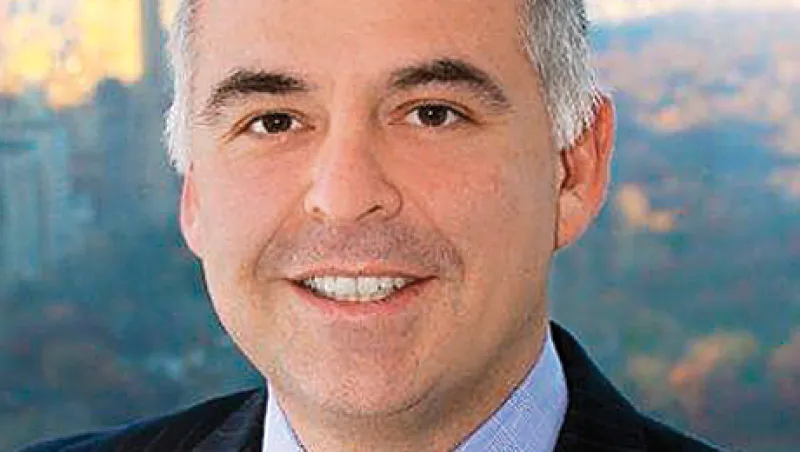FOR INDUS CAPITAL PARTNERS, 2013 COULD BE THE year of the hedge fund in mainland China. General counsel and partner Brian Guzman and his colleagues at New York–based private investment fund adviser Indus, which was spun out of legendary hedge fund manager George Soros’ firm more than a decade ago, have been eyeing the Chinese market for some time. With regulators poised to allow foreign hedge funds to set up shop in the country’s second-largest city, they’re optimistic.
Indus, which runs long-short strategies, plans to apply to the proposed qualified domestic limited partner (QDLP) program in early 2013. Under QDLP non-Chinese hedge funds would be able to establish marketing offices in Shanghai and gather assets from its institutional and high-net-worth investors. “These are tentative steps to open up to global investors,” says Guzman, whose firm opened a Hong Kong office in 2000 and manages $4 billion, roughly half of it in Greater China equities. “Our hope,” he adds, “is that regulators look at our industry with rational sense and see that firms such as ours are low-risk, low-volatility, long-term investors who add a lot to the markets in general, but specifically liquidity, efficiency and price discovery, which can ultimately reduce volatility.”
The Shanghai Municipal Financial Service Office is expected to formally launch the QDLP pilot program in the next few months by granting its first licenses, says Hubert Tse, a partner at Shanghai-based law firm Boss & Young whose clients include several managers on the waiting list. The quota for renminbi to foreign currency conversion hasn’t been announced, but Tse predicts it will rise after a few global alternative asset managers win approval and QDLP proves a success. A handful of firms, including Blackstone Group, Man Group and Millennium Management, have expressed interest, says Aradhna Dayal, head of Asia at research firm HedgeFund Intelligence.
Both sides have something to gain. Local and global hedge funds have long been active in Hong Kong, but mainland regulators legalized a domestic industry just two years ago. The latest careful move toward liberalization, QDLP suggests that Chinese authorities recognize hedge funds’ value and are serious about making Shanghai an international financial center by 2020. For foreign firms the program provides access to Chinese investors and a beachhead in the second-biggest equity market after the U.S. If China allowed widespread margin trading, it could be the world’s largest and most liquid market in less than a decade, Tse says. “It is not surprising that global hedge funds are positioning themselves to tap this opportunity,” he notes.
Unlike the established qualified foreign institutional investor (QFII) program, QDLP doesn’t permit trading of mainland Chinese securities such as A and B shares. But it is another step in the renminbi’s march toward full convertibility. Through a Shanghai-based entity, foreign hedge funds can invest the yuan they raise offshore. This is significant because it exposes Chinese capital to risks that domestic regulators can’t control, Tse says: “It sends a positive signal to the global hedge fund managers and investors that Shanghai is very committed to further financial and capital market opening and reforms.”
Smaller firms are welcome to seek licenses. In early 2013, Shanghai authorities will lower the asset threshold for QFII managers from $5 billion to $500 million and their minimum track record from five years to just two; the same rules will apply to QDLP hopefuls.
As a sign of the times, the Asia subsidiary of London-based futures and hedge fund manager Winton Capital Management has entered into a research consultancy agreement with Fortune SG Fund Management in Shanghai, which manages 36 billion yuan ($5.7 billion) and is a joint venture between Lyxor Asset Management and the Baosteel Group. The two firms will work closely together in such areas as investment in futures markets and product development for managed futures mandates in China. Fortune SG has just launched the first commodity trading advisor product in China. The fund is denominated in Renminbi, trading inside China and is available to domestic investors. As part of the agreement, Winton Capital Asia provides its research to Fortune SG.
China’s cautious embrace of hedge funds dates to late 2009, when the China Securities Regulatory Commission began permitting a few asset managers to do margin trading and short-selling with selected equities. The following year it allowed Guangzhou-based E Fund Management Co. to launch the mainland’s first hedge fund; today dozens of them raise capital from high-net-worth individuals through managed accounts. “Authorities realize the [important role] that hedge fund managers play in rooting out those who masquerade as creditworthy companies,” says Liu Zhen, head of index and quantitative investments at 180 billion-yuan ($29 billion) E Fund.
As China’s equity markets grow deeper and more complex, long-only asset managers are turning to global advisers for risk management programs that use index-linked, quantitative and alternative strategies, says Olivier d’Assier, Singapore-based head of Asia at portfolio strategy advisory firm Axioma. On the hedge fund side, many of New York–based Axioma’s Chinese clients are equity-focused, d’Assier explains. “The lack of flexibility of the regulatory regime for hedge funds in China will mean that we will be working closely with them on some very specific sources of alpha,” he says.
As for QDLP, attorney Tse reckons foreign hedge fund managers will be cautious too. “But if it turns out to work, then I think subject to cost-and-benefit analysis, more hedge funds would apply,” he says.






